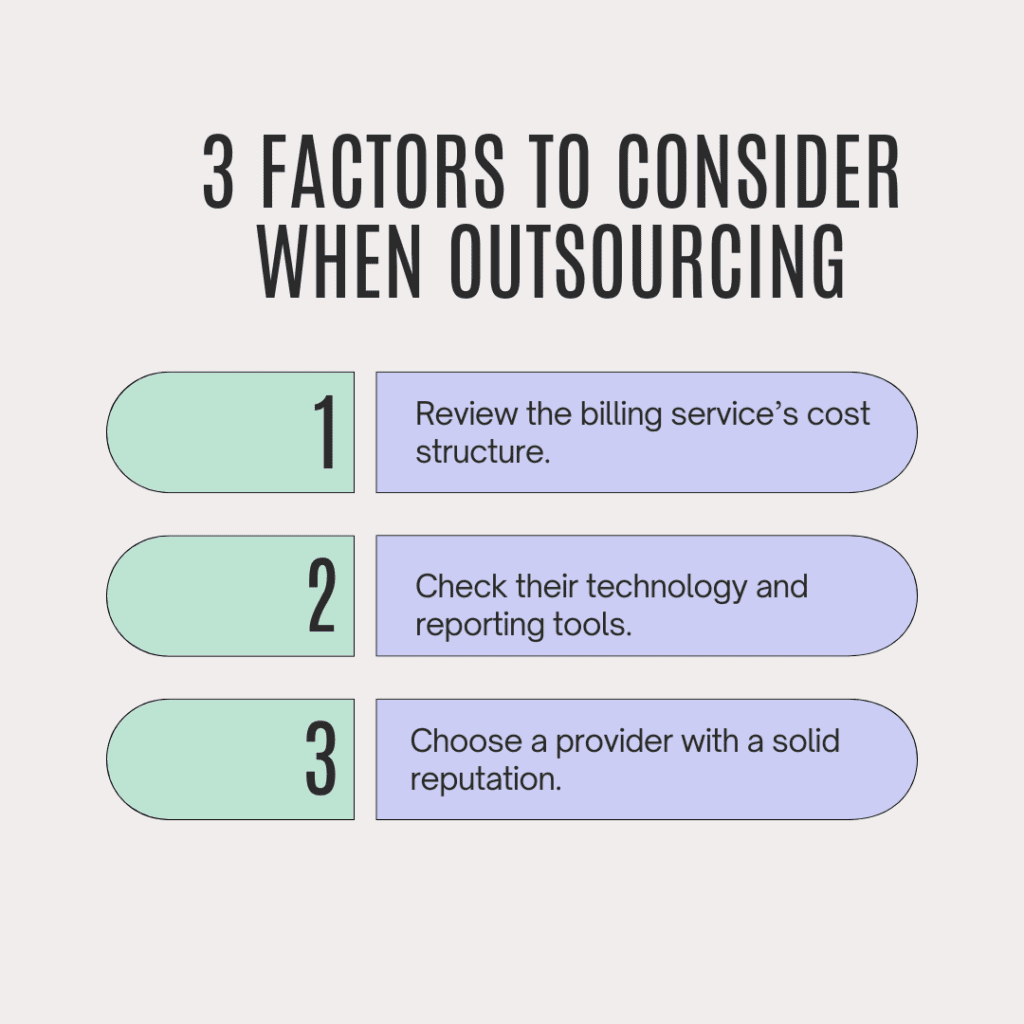24/7 Medical Billing Services to Boost Your Revenue
12 Nov 2024 By: Mary Dellosa
Updated
Lots of clinic owners feel the same way about billing.
They’re tired and understaffed. And they’re constantly trying to keep up with insurance rules.
That’s usually when they start looking into ways to outsource medical billing services. It gives them breathing room. It shifts the workload to people who do this all day. And it removes a lot of the stress they’ve been carrying.
Below are simple explanations of how outsourcing works and why so many clinics are choosing it now.

What is Medical Billing Outsourcing?
Medical billing outsourcing is when a clinic lets a third-party team take over the billing work.
- They submit claims.
- Call the insurance providers.
- Track unpaid balances.
- Collect payments.
This setup lowers stress for clinic staff. It also saves money because there’s no need to hire, train, or manage an internal billing team.
A lot of healthcare providers choose this route when patient volume grows and billing becomes too much to handle in-house.
Key Features of Outsourced Medical Billing Services
Here are the features practices usually notice first:
- Electronic claims submissions
Faster and more accurate. - Payment posting and follow ups
Keeps cash flow steady. - Denial management
Fewer missed opportunities. - Patient billing support
Helpful for clinics with small admin teams. - Advanced reporting tools
Gives clear insight into revenue trends.
Many healthcare outsource billing providers also scale easily. Small clinics get support that fits their workload, while larger groups get full billing teams.
Some even offer after-hours support or full 24/7 medical billing services for practices that never slow down.
The Impact of Outsourced Medical Billing on Revenue
One of the biggest benefits of outsourcing medical billing is how fast clinics see improvements in revenue.
- Claims go out quickly.
- Payments arrive sooner.
- Denials drop because coding is cleaner.
- Follow ups are handled right away.
Doctors get more time for patients, and the overall workflow becomes quieter and more organized.
How Outsourcing Can Increase Revenue
Here are a few simple ways outsourcing boosts income:
- Accurate coding reduces denials
- Faster submissions reduce delays
- Staff get more time to see patients
- Clinics can expand services because admin tasks go down
Most practices notice more predictable cash flow within a few months.
The Financial Benefits of Outsourced Medical Billing
There are several reasons clinics rely on medical billing outsourcing companies long-term:
- Lower overhead
No salaries or training costs. - Better compliance
Billing teams follow current regulations closely. - Industry expertise
Helpful when rules change often. - Scalability
Clinics don’t have to hire as they grow.
Healthcare outsource billing is also less risky because the billing company takes care of accuracy, regulations, and process updates.
Choosing the Right Outsourced Medical Billing Service
Choosing the right partner feels easier when you compare a few companies.
Look at reviews.
Ask other clinics what they use.
Check how each provider handles customer support.
Taking the time to evaluate options helps clinics avoid setbacks later.
Factors to Consider When Outsourcing

Here are three simple things to consider:
- Pricing
Make sure the fee structure fits your clinic. - Technology and reporting
Good analytics make revenue easier to understand. - Reputation
Certifications and strong reviews build confidence.
These factors help narrow down the list fast.
Evaluating Potential Medical Billing Service Providers
Whenever clinics compare providers, these questions help:
- Do they support your specialty?
- What training does their team have?
- How do they handle denied claims?
- How quickly do they respond when you need help?
These details can tell you a lot about how they work.
Implementing Outsourced Medical Billing in Your Practice
If your clinic decides to outsource medical billing services, start with clear communication.
- Let your team know what’s changing.
- Explain the new workflow.
- Give everyone time to ask questions.
Set clear guidelines for handing over billing duties. Make sure all necessary patient data is securely shared with the billing provider to keep everything accurate and on track. A checklist can help you keep track of the transfer process, ensuring nothing important gets missed.
Transitioning to an Outsourced Model
The transition works best when both sides follow a clear timeline. Setting milestones for onboarding, setup, and training helps avoid confusion. It also keeps the process organized.
Some clinics assign one internal contact who communicates with the billing partner. This keeps everything simple and reduces the risk of missed information.
When both sides stay aligned, the transition feels steady instead of stressful.
Managing the Outsourced Medical Billing Process
Once everything is in place, it’s important to track key performance indicators.
- Days in accounts receivable
- Denial rate
- Payment cycle speed
These numbers show how well the revenue cycle is performing.
Regular check-ins with your billing partner help maintain transparency. These meetings give both sides a chance to review progress, solve problems, and make improvements. Over time, this becomes a smooth partnership that supports the financial health of the practice.
The Future of Outsourced Medical Billing Services
Medical billing is becoming more technology-driven every year. Automation helps reduce human error. AI tools assist with coding and documentation. And integration with EHR systems creates a more seamless flow of information.
As these technologies grow, clinics benefit from faster processing, fewer mistakes, and clearer revenue tracking. Healthcare outsource billing companies are adopting these tools quickly because they help practices stay competitive.
Emerging Trends in Medical Billing Outsourcing
There are several trends shaping the future of medical billing outsourcing.
Telehealth is increasing, which brings new types of claims and documentation requirements. Billing teams are learning how to navigate these changes.
Patients want clearer billing information, so engagement tools and online payment portals are becoming more common.
Value-based care is also changing the way clinics are paid. Billing companies now need to track outcomes, not just services, which adds new layers to the billing process.
These trends show how the industry is changing and why outsourcing is helping clinics stay ahead.
How Technology is Shaping Outsourced Medical Billing
Technology is making billing faster and more secure. Software systems track key metrics automatically. EHRs integrate more smoothly with billing platforms. Automation speeds up claim creation. And blockchain tools are being explored for better data protection and transparency.
These advancements help billing companies deliver more reliable and accurate services. They also give clinics better insight into their financial performance without extra effort.
Trending now
More clinics are turning to outsourcing because the financial stakes are getting higher. Regulations shift frequently. Coding becomes more complex. And administrative workloads keep growing.
The industry is projected to grow more than 12 percent annually through 2030. Clinics can reduce billing costs by up to 30 percent and increase revenue by 15 to 25 percent. Patient satisfaction even improves when billing is smoother and more accurate.
Conclusion
These benefits create a strong case for outsourcing medical billing services. especially for practices that want stability without increasing their internal workload.
Boost your medical practice’s revenue and efficiency with HelpSquad BPO. Our skilled, bilingual agents provide 24/7 support, handling back-office tasks, customer service, and research. Improve productivity and patient satisfaction. Talk to HelpSquad today and feel the difference!
FAQ
Why do clinics choose to outsource medical billing services?
Many clinics choose to outsource medical billing services because it removes a heavy administrative workload. Billing companies handle claim submissions, follow ups, coding accuracy, and patient balances. This gives clinics more time for patient care and leads to faster, cleaner reimbursement cycles. It also helps practices avoid the constant stress of keeping up with insurance rules and coding changes.
What are the benefits of outsourcing medical billing for a busy clinic?
The benefits of outsourcing medical billing show up quickly. Claims get processed faster. Denials drop. Payments become more predictable. Clinics also save money because they don’t need to hire or train internal billers. And since many medical billing outsourcing companies offer access to specialists, clinics get accuracy and compliance support they may not have in-house.
Do outsourced medical billing companies provide 24/7 medical billing services?
Some medical billing outsourcing companies do offer 24/7 medical billing services. This is especially helpful for practices with high patient volume, multiple locations, or extended hours. Round-the-clock billing ensures no claims pile up overnight, and payments stay on schedule. Clinics with after-hours telehealth services often find this feature very useful.
How do I know if healthcare outsource billing is the right choice for my practice?
It’s usually the right choice if billing is taking too much time away from patient care or if revenue feels inconsistent. Healthcare outsource billing helps when denial rates are high, collections are slow, or your in-house team is overwhelmed. If your practice is growing, outsourcing also provides scalable support without the pressure of hiring additional staff.
Where does HelpSquad get its information about outsourced medical billing services?
We rely on a mix of real-world experience and ongoing research. Our team works closely with clinics, billing experts, healthcare administrators, and industry partners every day. We study how revenue cycles change, how medical billing outsourcing companies operate, and what challenges practices face behind the scenes. The information we share comes from hands-on work, client feedback, trusted healthcare sources, and continuous updates from the billing industry. This helps us give guidance that’s practical, current, and grounded in what clinics are experiencing right now.


